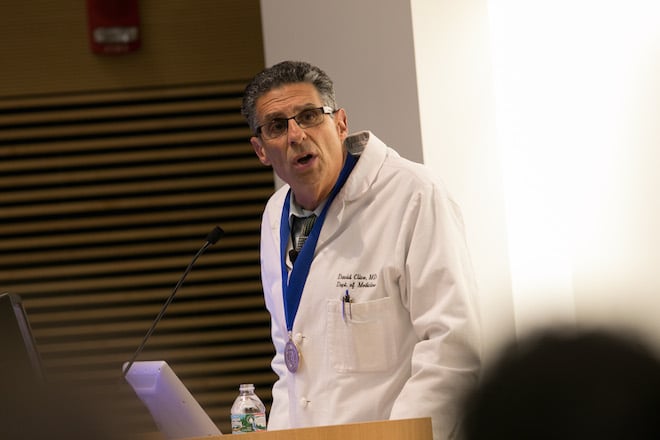 |
|
| David Clive, MD, professor of medicine gives the Last Lecture during the 2015 Educational Recognition Awards. |
Twenty-four people who have made significant contributions to the education of students at UMass Medical School were recognized Thursday for their selfless dedication and excellence in teaching during the 17th annual Educational Recognition Awards.
“Our faculty are at the very heart of our educational mission and contribute so much to the success of our school,” Chancellor Michael F. Collins said at the opening of the ceremony held May 7 in the Albert Sherman Center auditorium.
The deans and students of the Graduate School of Nursing, Graduate School of Biomedical Sciences and School of Medicine singled out 21 exceptional faculty members for excellence in teaching, research and service. In addition, three patients-as-teachers were recognized for their commitment to the betterment of students. (See the full list of awardees below.)
As is tradition, after the awards were presented, the recipient of last year’s Chancellor’s Medal for Distinguished Teaching, awarded at Convocation 2014, was invited to share words of wisdom with his peers and students with a Last Lecture.
In his lecture, David M. Clive, MD, professor of medicine, asked his peers to reflect upon changes that have occurred in medical education and health care in the past few decades and consider whether actions taken, regulations implemented and technological advances meant to improve the fields have resulted in unintended consequences since their execution.
Dr. Clive used the more than century old tale of the Monkey’s Paw by W.W. Jacobs to highlight three changes made in recent decades that, in some ways, have improved patient care and the work environment for residents, and enhanced the capabilities of professors to teach and communicate with students.
However, like the wishes made by the elderly couple in Jacob’s story, each has had an unintended consequence, in Clive’s opinion. The changes, from the rigid restrictions on residents’ working hours to the implementation of live streaming and the overuse of PowerPoint presentations in medical school lectures, have disrupted the continuum of care between doctor and patient and inadvertently decreased the personal interaction between professor and student, Clive said.
For each, Clive recommended serious study of the results on residents, patients, and students before future adjustments are made and the communication and connective divide expands.
He closed by emphasizing that medicine is a humanistic endeavor. “Person-to-person contact – even in the classroom – affirms this concept.”
2015 Educational Recognition Awards:
Graduate School of Nursing:
- Dean’s Award: Karen Lee Dick, PhD, GNC-BC, FAANP
- Distinguished Faculty Award: Master’s – Dawn Carpenter, DNP, ACNP-BC; Doctoral – Nancy J. Morris, PhD, ANP-BC
- Patient as Teacher: Beth Walsh Lambert and Michael Walsh
Graduate School of Biomedical Sciences:
- Dean’s Award: Diversity Initiative Group – Sharon B. Cantor, PhD; José R. Lemos, PhD; Brian Lewis, PhD; Neal S. Silverman, PhD; and Robert T. Woodland, PhD
- Faculty Award: William M. Jesdale, PhD; David R. Weaver, PhD; Michael M. Francis, PhD; Stephenie Lemon, PhD; Ana Luisa Maldonado-Contreras, PhD; and William E. Royer, PhD
School of Medicine:
- Dean’s Award, Lamar Soutter Award for Excellence in Undergraduate Medical Education: Mary O’Brien, MD
- Educational Achievement (Star) Award: Christopher Marshall, MD; Lan Qin, PhD; Vijay K. Vanguri, MD; and Paul A. Zgurzynski, MD
- Retired Faculty Teaching Award: Peter Grigg, PhD, and Oscar Starobin, MD.
- Patient as Teacher Award: Melissa Hathaway-Vaz